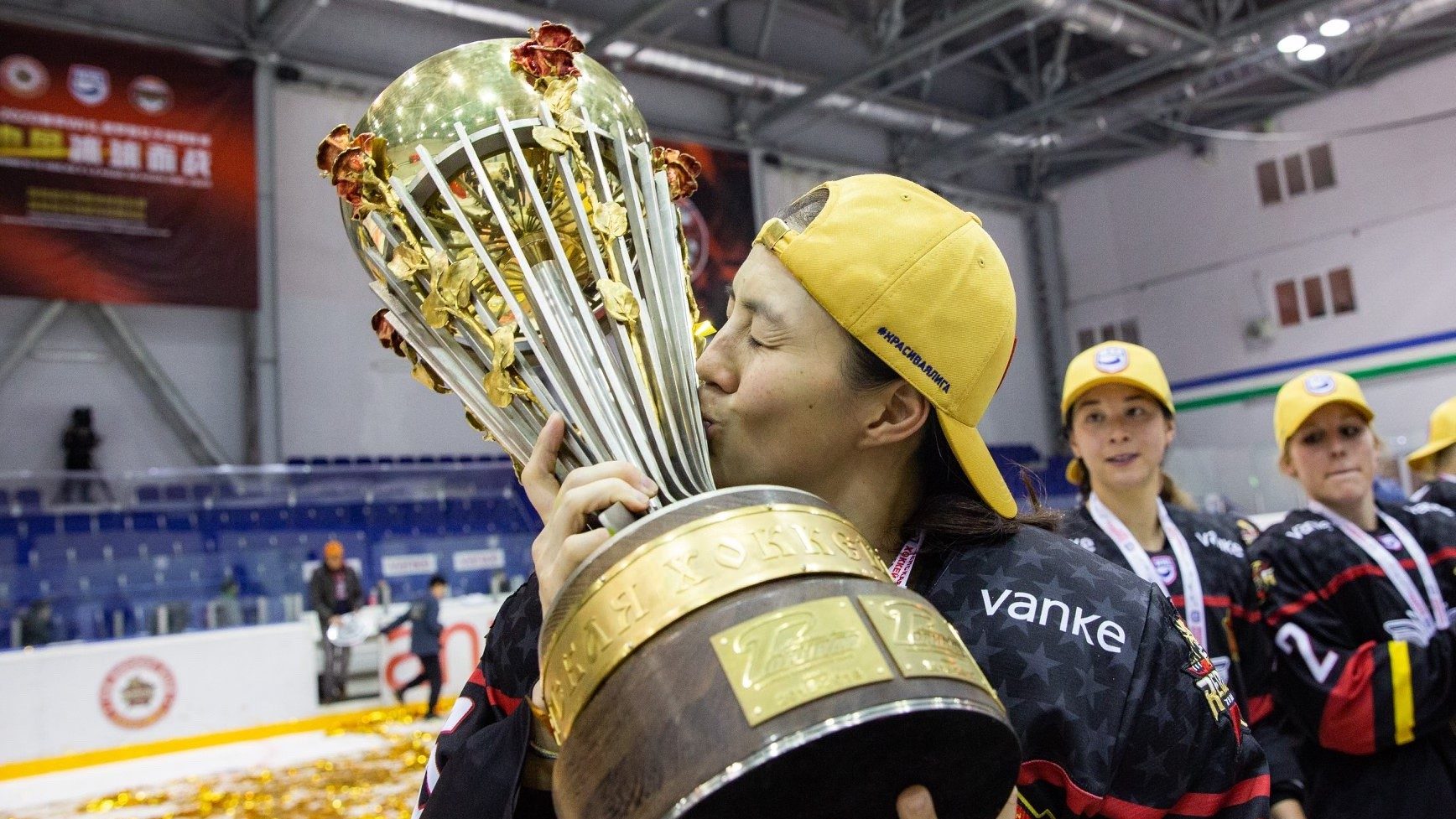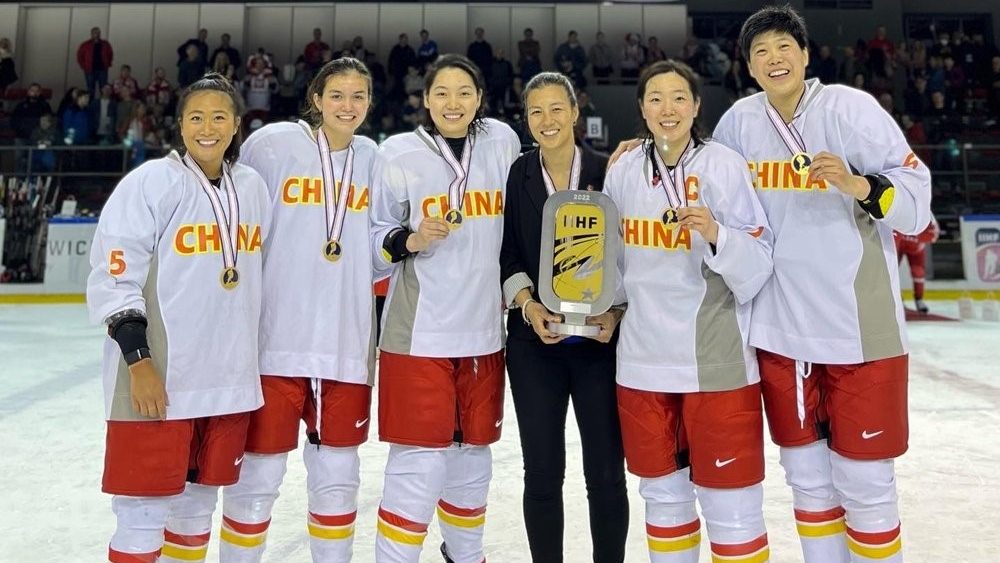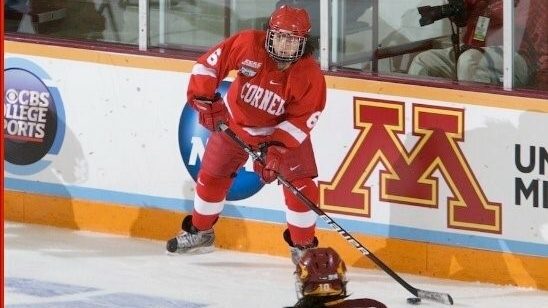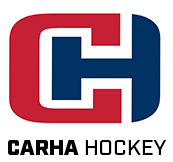With National Coaches Week running from September 16-22, CARHA Hockey had the privilege of speaking with Melanie Jue, founder of Empower Hockey and Head Coach of the Greater Vancouver Comets U18AAA club. Drawing from her vast experience both as a player and coach, Melanie shared valuable insights into the multifaceted world of hockey coaching and how her playing career has shaped her coaching philosophy.
CH: How did your experiences as a collegiate player at Cornell University and professionally for Kunlun Red Star shape your coaching philosophy and approach to developing female hockey players?
MJ: I’ve been incredibly fortunate to have the experiences I’ve had as both a player and a coach, and they’ve deeply shaped my coaching philosophy. At Cornell University, I was part of a rebuilding process, which taught me the importance of culture and focusing on the process. I learned so much from Coach Derraugh and his staff, particularly how a team can evolve year after year through dedication and commitment to the right mindset. When I started at Cornell, we only won four games, but by my senior year, we were competing for a national championship. That journey instilled in me the belief that progress is about more than just talent; it’s about building a foundation and continuously improving, and that’s a message I carry into my coaching.
Playing for Kunlun Red Star was an equally eye-opening experience but in a different way. After coaching professionally for seven years, I returned to competitive play, which is a rare opportunity. It allowed me to see the game from both a player’s and a coach’s perspective. That experience highlighted for me the importance of mental skill development for elite athletes, something I might have taken for granted when I was younger. As a player, you often just follow instructions, but as a coach, you have to understand the game holistically. Playing again after so many years helped me appreciate how athletes perceive a coach’s message and gave me a clearer understanding of what truly works in terms of development and communication.

CH: As a co-founder of Empower Hockey, what inspired you to start this initiative, and how do you see it influencing the next generation of female hockey players?
MJ: When I returned to Vancouver, I noticed a significant gap in the coaching and learning opportunities available for female hockey players. There was no shortage of skill programs and camps, but female players often seemed like an afterthought. More importantly, I found that many players were simply following instructions without truly understanding how to learn, process information, or make decisions. They lacked awareness, mindfulness, and intention in their training. The female game is different, not just in terms of skill but also in how female athletes learn and develop, both physically and mentally.
This realization inspired me and my co-founders to create Empower Hockey—a space dedicated to female ice hockey players, where they can not only hone their skills but also learn to think critically, make decisions, and approach the game with a clear purpose. We wanted to provide these athletes with all the tools necessary for them to achieve success, whatever that looks like for them, and to ensure they weren’t just going through the motions but truly developing as complete players.
Representation also played a big part in our vision. Growing up, I had mostly male coaches—some of them were excellent—but the few female coaches I did have made a lasting impact on me. They were role models in a way that male coaches couldn’t be, and their presence made me believe in my own potential. That’s why Empower Hockey emphasizes female coaching representation. It’s important for young players to see someone who looks like them, who understands their unique journey. If you can see it, you can be it, and that’s what we aim to inspire.
CH: What were some of the most significant challenges and rewards you encountered while coaching Team China at the 2021-22 IIHF World Championships?
MJ: One of the most significant rewards of coaching Team China at the 2021-22 IIHF World Championships was the chance to represent a country that means so much to my family. It was incredibly meaningful to contribute to the development of hockey in China, knowing the personal connection I have to the country.
On the other hand, one of the biggest challenges was the quick turnaround. After not being part of the Olympic team, I had to regroup and refocus, joining the coaching staff only a few short months later. It was a mental and emotional shift, but ultimately, I was able to channel that energy into helping the team at the World Championships.
Another challenge was the language barrier. Although many players and staff spoke English, there were still moments where communication was difficult. However, this experience allowed me to step into a new role and help the China hockey organization on a more administrative level, something I couldn’t have done as a player. I worked with the staff to create a clearer vision for their program and to redefine what success looked like, not just in terms of wins and losses but also in terms of long-term development. That aspect of coaching—being able to influence the direction of a national program—was incredibly rewarding.

CH: Can you share a standout moment from your coaching career that had a lasting impact on how you coach your players today?
MJ: One of the standout moments in my coaching career was my time at the Pursuit of Excellence, now known as RINK Hockey Academy. It was where I got my start as a coach and where I truly fell in love with teaching players how to learn, think, and chase their dreams. I had the privilege of learning from Scott Spencer, and that experience shaped so much of how I approach coaching today.
Those first two years were pivotal for me. The group of players I worked with taught me so much about the importance of guiding athletes not just physically, but mentally—helping them to understand the game, make decisions, and set goals. And what’s really special is that I still stay in touch with many of those athletes. The relationships we built almost 14 years ago remain strong, and I’ve been fortunate enough to be part of some critical moments in their lives, whether they’re still playing or have long since left their playing days behind them. Seeing them grow and evolve reminds me that the impression you leave as a coach can be a lasting one.
Without that experience and those relationships, I don’t think I would be the coach I am today. To be a part of an athlete’s journey, to help them grow and chase their dreams, is an incredible honor. The foundation I built at the Pursuit of Excellence has stayed with me throughout my career and influences how I coach every player I work with now.
CH: Being named to the Cornell University Athletics Hall of Fame is a significant honor. How does this recognition influence your work with young athletes and your approach to coaching?
MJ: Being named to the Cornell University Athletics Hall of Fame is an incredible honor, but it wasn’t something I ever set out to achieve. For me, it’s a reminder that when you focus on the process, take care of the things you can control, and let go of the things you can’t, you can accomplish more than you ever thought possible. I didn’t grow up with the goal of making it to the Hall of Fame—I just loved hockey, sports, and competing. Every time I had the chance to play, I wanted to be the best I could be.
I think too often, players and parents limit themselves before they even begin. I was lucky that I didn’t see those limits, and my parents never told me I couldn’t achieve something. Whether it was balancing multiple sports, school, or volunteering, it was just part of my routine. I never thought something was impossible or too hard, I just did it.
That’s the same approach I try to instill in my athletes. Why not you? Whether you’re new to the game or have been playing for years, there’s no reason you can’t achieve your goals. It can click for anyone, and I truly believe that. I’m not special by any means—anyone can get there with the right mindset and work ethic.

CH: With your extensive coaching experience across various levels and countries, how do you tailor your coaching techniques to fit the diverse needs of your players, especially in the U18AAA category?
MJ: At its core, I believe coaching is about releasing a player’s potential to maximize their own performance. It’s less about teaching them and more about helping them learn how to learn. That principle holds true at any level, but the techniques and approach can vary depending on the player’s age, communication style, and attention span. The key is getting to know the athlete and meeting them where they are. If we can help them become aware, mindful, and intentional in their approach, the sky is the limit. The earlier they learn that, the more limitless their potential becomes.
In the U18 AAA category, most of these athletes are motivated to pursue college athletics, so the drive is already there. But sometimes, having a concrete goal like that can add pressure and take the focus away from the process. Athletes can get too caught up in the end result and forget to build the habits and processes that will actually help them reach those goals. So, while we keep the big picture in mind, we primarily focus on the controllables—the daily habits that will put them in the best position for success.
A big part of my coaching philosophy is helping athletes understand that not all hard work leads to immediate rewards, but if you don’t put in the work, the reward definitely won’t come. Discipline and commitment are tough because there’s no guarantee of success, but I try to guide my players toward falling in love with the process itself. That’s where real growth happens, and it’s how they can achieve their full potential, whether they’re playing at the U18 AAA level or beyond.
CH: What are your primary goals for the Greater Vancouver Comets U18AAA team this season, and how do you plan to foster both individual and team growth throughout the year?
MJ: My primary goal for the Greater Vancouver Comets U18AAA team remains consistent: to help these athletes become the best version of themselves both on and off the ice. If we can achieve that, the accolades, wins, and recognition will naturally follow. This season, I believe the key to our success will be consistency in our fundamental habits and a strong dedication to the details. Focusing on these small elements will allow us to grow both individually and as a team.
What makes this year even more special is the incredible group we have. There’s a unique energy in the locker room—players who have trusted the coaches and the processes are now being rewarded, and the new additions have made us that much stronger. There’s magic within this team, and the sky is the limit for what we can achieve. While I think we have a real chance to go deep this season, I’m certain that we’ll push each other to be better every day and, more importantly, have a lot of fun together.
I love this team, and I’m excited to see how far we can go. The bond we’ve built, combined with our commitment to the process, will be the foundation for everything we accomplish this year.
